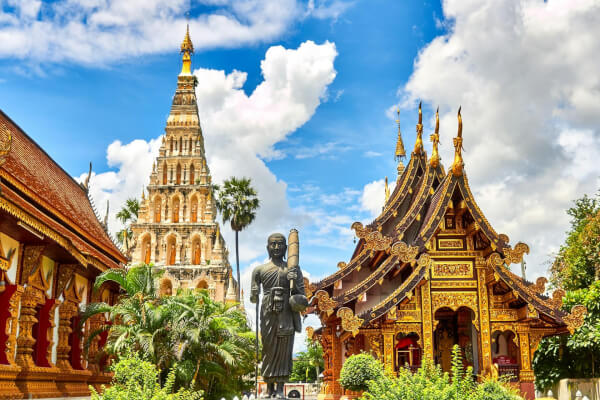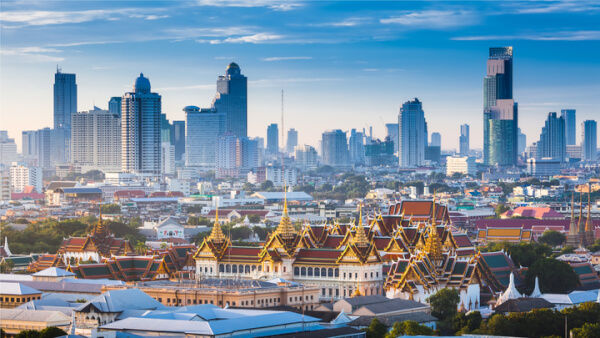Best Time to Visit Thailand from Australia: What to do, weather, visas, and more
Wondering when the best time to visit Thailand from Australia is? Learn more about weather, seasons and what to do throughout the year in Thailand.

Thailand, often called "The Land of Smiles," is renowned for its welcoming atmosphere, stunning landscapes, vibrant culture, and rich history. It's a popular destination for tourists seeking relaxation and adventure, as well as expats looking for a change of pace or a place to retire.
Whether you're planning a short holiday on Thailand's beautiful beaches or considering a longer-term stay, understanding the local currency can be a bit tricky at first.
This guide provides an overview of Thailand's currency (the Thai Baht), banking, and exchange services, giving you a head start on managing your money when you arrive. It also introduces Wise as a great tool for managing your finances while in Thailand.
The official currency of Thailand is the Thai Baht (THB). Both coins and banknotes are used.
| Baht Symbols & Names | THB, ฿, บาท |
|---|---|
| 1 THB | Each Baht is divided into 100 satang (สตางค์). |
| THB Coins | While satang coins exist, they are rarely used in everyday transactions. Most businesses round to the nearest Baht. You'll commonly see coins in denominations of 1, 2, 5, and 10 Baht. |
| THB Banknotes | Banknotes are issued in denominations of 20, 50, 100, 500, and 1,000 Baht. |
There are currently two different series of banknotes in circulation in Thailand. Both are legal tender, but they have slightly different designs. Both series feature the image of the King of Thailand, and it's important to treat Thai currency with respect, as the monarchy is highly revered.
You can check the validity of banknotes against images provided on the Bank of Thailand's website if you have any concerns.
The Thai Baht is the only legal currency in Thailand. While some tourist-oriented businesses might accept other currencies (like U.S. dollars), the exchange rates offered will almost certainly be very unfavorable. It's best to use Baht for all transactions.
Generally, you'll find better exchange rates for Thai Baht in Thailand compared to your home country. However, it's always wise to be informed and compare rates.
Many exchange services in Thailand advertise "zero commission" or "no fees." However, these businesses typically make their profit by offering a less favorable exchange rate. Always check the offered rate carefully.
To determine if you're getting a fair deal, you need to know the mid-market rate (the same one you usually see on Google). This is the "real" exchange rate – the midpoint between the buy and sell rates on the global currency market. Use an online currency converter to find the current mid-market rate and compare it to the rates offered by exchange services.
Currency exchange desks at airports and hotels often offer poor exchange rates. If you need Baht immediately upon arrival, exchange only a small amount. For larger amounts, wait until you can find a bank or currency exchange service in a more competitive area (like a city center). ATMs are also an option at the airport, and often offer better rates than the exchange counters.
When exchanging cash, make sure your banknotes are in good condition – clean, crisp, and without any significant damage or markings. Exchange bureaus may refuse to accept damaged notes.
American Express Traveller's Checks can be exchanged at banks and some exchange offices in Thailand, but other types of Traveller's Checks may be difficult to cash. You generally can't use them for direct payments. Exchanging Traveller's Checks often involves fees per check, so it's more economical to use larger denominations. However, even with larger denominations, the exchange rates are often not competitive, and you'll have limited options for where to cash them.
For convenience and better value, most travelers now prefer to use ATMs and debit/credit cards.
Major credit and debit cards (Visa, Mastercard, American Express) are accepted in larger businesses, hotels, and restaurants, especially in tourist areas. However, many smaller shops, local markets, and street food vendors only accept cash. It's crucial to carry sufficient Thai Baht at all times.
Notify your bank of your travel dates to Thailand before you depart to prevent your card from being blocked due to suspected fraudulent activity.
When using your credit or debit card, you may be asked if you want to be charged in your home currency. This is Dynamic Currency Conversion (DCC). Always decline DCC. It allows the merchant's bank to set the exchange rate, which is almost always worse than your own bank's rate. Always choose to be charged in the local currency (THB).
ATMs are readily available throughout Thailand, particularly in cities and tourist areas. Cash is the preferred payment method for many Thais, so ATMs are a convenient option for travelers.
Use these locator tools to find ATMs near you:
Before you travel, check with your home bank about their fees for international ATM withdrawals and foreign transactions. Additionally, be aware that most Thai ATMs charge a fee per withdrawal (typically around 220 Baht, but this can vary).
As with credit/debit card transactions, ATMs may offer DCC. Always choose to be charged in the local currency (THB) to get the best exchange rate from your bank.
Thailand has a well-established banking network. The largest banks often have operations beyond Thailand's borders. Bangkok Bank is the largest, with a significant presence in Southeast Asia and offices in major international cities. Krung Thai Bank is majority state-owned, and Siam Commercial Bank is Thailand's oldest bank.
Check if your home bank has any partnerships with Thai banks. This could potentially allow you to use ATMs in their network for free or at reduced fees.
While traditional banking methods are available, Wise offers a convenient and cost-effective alternative for managing your finances in Thailand.
By using Wise, you can potentially save a significant amount of money on currency exchange and international transactions, making your trip to Thailand more affordable.
*Please see terms of use and product availability for your region or visit Wise fees and pricing for the most up to date pricing and fee information.
This publication is provided for general information purposes and does not constitute legal, tax or other professional advice from Wise Payments Limited or its subsidiaries and its affiliates, and it is not intended as a substitute for obtaining advice from a financial advisor or any other professional.
We make no representations, warranties or guarantees, whether expressed or implied, that the content in the publication is accurate, complete or up to date.

Wondering when the best time to visit Thailand from Australia is? Learn more about weather, seasons and what to do throughout the year in Thailand.

Find the best travel insurance for Thailand. Compare Australian providers' coverage options and prices for your Thai holiday.

Planning your Thailand trip? This guide covers the entry requirements and visa options available for Australians.

Wondering when the best time to visit Phuket is? Learn more about weather, seasons and what to do throughout the year in Phuket.

Thailand is a hotbed for tourists from abroad. If you’re traveling from the US, Britain, or Australia, there are usually no compulsory vaccinations required...

Are you travelling to Thailand for your dream holiday?If so, you may be worried about where to get a good deal on Baht (Thai currency). While ATMs are...